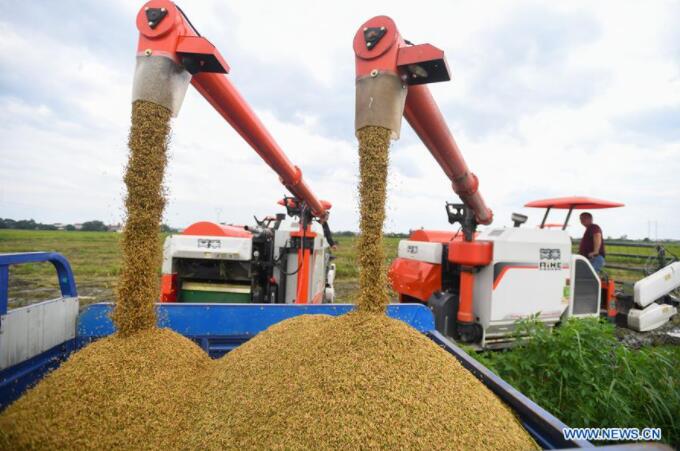CCPIT Sub-council of Chemical Industry
Add: Bldg 16, Block 7, Hepingli, Beijing, China
Tel: +86-10-64283093, 84255960
Email: zhaoqing@ccpitchem.org.cn

Country's experience in reducing waste, increasing output shared around world
China's accumulated experience in reducing food loss and waste is being shared with the world and can help developing countries improve their ability to reduce food loss and ensure food security, experts and officials said.
About 14 percent of the world's food is lost during the processes from production to retail, and reducing that loss by 1 percentage point would be equal to a 28 million metric ton increase in grain output, which could feed 70 million people for a year, according to the State of Food and Agriculture 2019 report released by the United Nations Food and Agriculture Organization.
According to the FAO, over 155 million people experienced acute food insecurity in 2020, the highest number in the past five years, because of conflict, extreme weather events and economic shocks related to COVID-19.
Wu Laping, a professor at China Agricultural University's College of Economics and Management, said food loss and waste is largely affected by economic development, with developing countries losing food mainly before it is retailed and developed countries after retail.
For instance, food loss and waste mostly occurs in harvesting and storage in Africa and South Asia. Up to 30 percent of food loss was found during farmers' storage in some areas in Africa, and 21 percent of food in the United States was wasted during daily consumption, Wu told Economic Daily.
Compared with the world average, the food loss and waste situation in China is comparatively better. China loses 35 million tons of grain before retail each year, an amount roughly equal to the overall grain output of Sichuan province last year-35.8 million tons.
China's experience shows that increasing grain output while reducing food loss and waste is a significant way to ensure national food security. In November, the country issued an action plan on saving food in multiple procedures to add "invisible" high-quality farmland.
Meanwhile, the reduction in loss and waste saves land, water, fertilizer and pesticides, and thus protects the environment and reduces carbon dioxide emissions, helping sustainable development.
"Because different countries face food loss and waste in different procedures, each country should find measures based on its situation," Wu said.
Lesser developed economies should focus on saving food during harvest and storage, which can be achieved by promoting varieties that can resist unfavorable conditions, such as weather and pests, and by improving modern agricultural machinery, high-quality storage and transportation equipment, he added.
China has made progress in saving food by promoting laws against food waste and action plans on saving food and reducing loss in the whole process from harvest to retail, Zhou Guanhua, of the National Food and Strategic Reserves Administration, said last month.
"We have built 5,400 postproduction service centers, covering 1,000 major grain-producing counties in the country, to provide services including cleaning, drying, storing, processing and retailing," Zhou said, adding that the daily drying capacity can reach 1.1 million tons.
The centers can greatly reduce food loss that occurs through poor storage facilities and limited drying ability after harvest, as some farmers in Northeast China still dry grain on the ground or pile it in their yards.
Innovation, technologies and infrastructure are critical to increasing the efficiency of food systems and to reducing food loss and waste.
Zhou said new technologies to better store grain have been applied in warehouses. "Large grain depots in the country can reduce the rate of grain loss during storage to less than 1 percent."
The special vehicles for bulk grain, devices for unloading grain trucks, and automatic scales have proved effective, he said.
'Healthy eating'
People's growing awareness of "healthy eating" instead of seeking out refined staple foods has gradually prompted processing companies to transition from overprocessing to moderate processing.
"China is developing key technologies and equipment for moderate processing to help solve the problem of nutrition loss and impaired protein function due to overprocessing."
In September, China hosted the International Conference on Food Loss and Waste in Shandong province. The recent food action plan proposes to make the conference a regular event.
Ma Youxiang, vice-minister of agriculture and rural affairs, said China would take the conference as an opportunity to promote establishing an international cooperation mechanism for reducing food loss and working together to boost world food security.
As the largest developing country, China has actively participated in global food and agriculture management, launching cooperative procedures in saving food with other countries.
Under the projects of the FAO, the World Food Programme and other international organizations, China shared information, techniques and talent with other countries, especially developing ones, to improve their ability to reduce food loss, Ma said.
Sui Pengfei, director of the ministry's department of international cooperation, said the country will strengthen its collaborative research and development of techniques and equipment applied to key procedures for saving food.